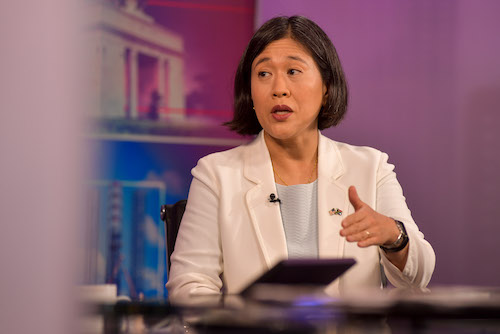The US told the European Union that if it reopened a case at the World Trade Organization against Washington over a Trump-era steel and aluminum dispute then it would risk sinking the bloc’s attempt to fix a pillar of multilateral trade cooperation.
US Trade Representative Katherine Tai told her Group of Seven counterparts last month that if the EU filed the complaint, it would have consequences on efforts to reform and revive the WTO’s dispute settlement system, according to European diplomats and officials familiar with the discussion. She added that the US would calibrate its cooperation with the EU on WTO reform based on the bloc’s actions, they said.

The appellate body — the preeminent forum for settling worldwide trade disagreements — is currently hamstrung due to American maneuvering. Restoring a fully functional dispute settlement system has been a key priority for the Europeans.
Tai’s comments risk reinforcing skepticism in Europe that the transatlantic trade relationship has improved since President Joe Biden came to office. Trump sparked a trade war with Europe when he came to office, leading to tariffs on billions of dollars of exports. But Biden has since opted to not remove some of Trump’s coercive measures, irking his European allies.
Spokespeople from the USTR and from the European Commission, the EU’s executive arm, declined to comment.
Tai’s comments were meant to advise the EU about the repercussions of restarting the WTO complaint with American constituencies, and not meant as a threat of the action that the USTR would take, according to Biden administration officials familiar with the conversation.
The trade conflict started when Trump imposed levies on European steel and aluminum, citing national security concerns, prompting the EU to retaliate with restrictive measures of its own. The bloc joined a WTO case against the US in 2018, then the EU reached a temporary truce with the Biden administration in 2021.
As part of that truce, the US partly removed its measure and introduced a set of tariff-rate quotas above which duties on the metals are applied. Alternately, the EU froze all of its restrictive measures. That has created an unbalanced situation, according to the EU, that has seen the bloc’s exporters pay over $350 million a year in duties.
Tai’s remarks didn’t take the Europeans by surprise since the US in their view hasn’t shown readiness to be flexible on reforming the WTO, said the European diplomats, who spoke on the condition of anonymity.
The discussion took place weeks before the WTO’s ministerial meeting in Abu Dhabi, where restoring the appellate body was one of the key issues on the agenda. During the meeting, members committed to having “a fully and well-functioning dispute settlement system accessible to all members by 2024,” and instructed officials to accelerate work on unresolved issues, including the appeal level.
The commission told member states late last year that it was considering relaunching a case against the US at the WTO, but that idea lacked broad support among member states, Bloomberg reported at the time. They were wary of inciting a fresh dispute with Washington given the current geopolitical context.

Follow us on social media: